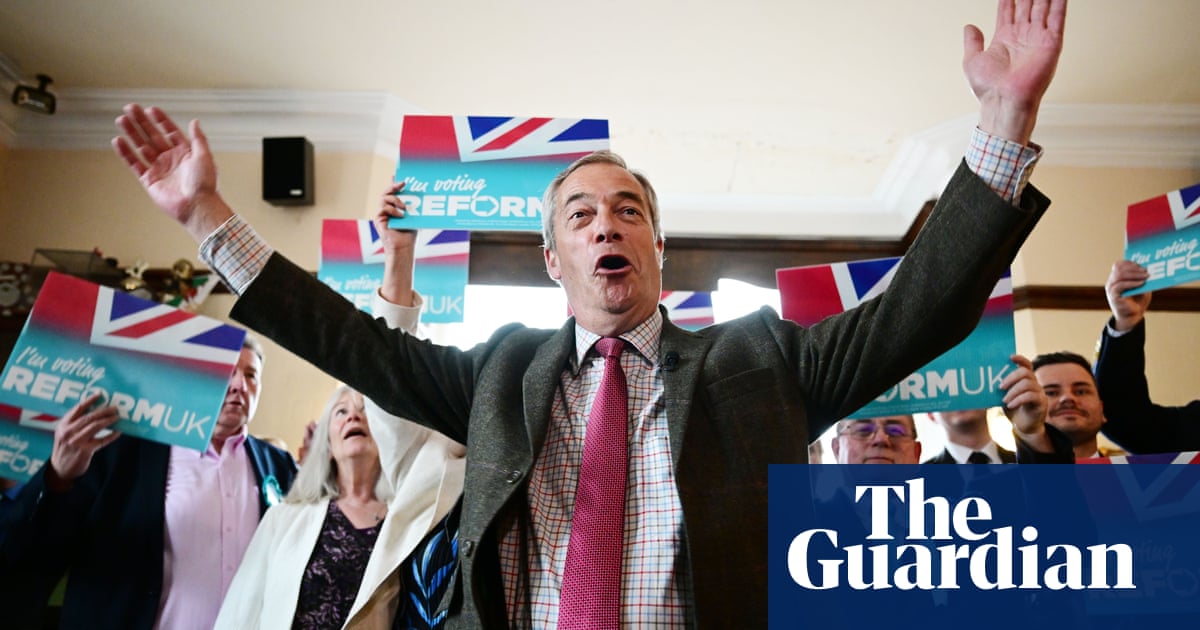Nigel Farage has defended allowing labelled chlorinated chicken from the US into the UK as part of a trade deal, as a poll suggested his Reform UK party could be on course to take the highest number of seats at a general election.
Speaking before the local elections inEnglandon 1 May, Farage said British consumers already ate chicken from places such as Thailand reared in poor conditions, and accepted chlorine-washed lettuce.
He told theSunday Times: “If you have a look at the chicken we are currently importing from Thailand, you look at the conditions they’ve been reared in, and that every single bag of pre-made salad in every single supermarket has been chlorinated … once those basics have been accepted I’ll have a debate with you.”
Asked how he would prevent British chicken farmers being undercut by cheap producers from the US, he said: “I want to promote British farming as being a high-end product. I think the growth of farmers’ markets, they are a much more discerning audience that wants to know where their meat comes from. I don’t think British farmers have anything to fear from this long term.”
Both the government and the Conservatives have objected to US demands for its producers to be able to sell chicken withlower welfare standardsin the UK. Britain does not allow imports of products such as chlorine-washed chicken and hormone-injected beef and Donald Trump has been pushing for agriculture to be part of a trade deal if the UK wants tariffs to be lowered on its exports such as cars and steel.
In the interview in Lancashire, whereReform is challengingboth the Tories and Labour for council seats, Farage also spoke about his rift with Trump’s adviser the US billionaire Elon Musk, who had been pushing for him to take a harder line on immigration and support the far-right figure Tommy Robinson.
He said he had been in contact with Musk since their spat on X, but added: “I’ve fought against this for 25 years. You can’t bully me, I know what I think is right and what I think is wrong. Nobody pushes me around – not even him.”
Reform is hoping to take hundreds of seats off the established parties at the local elections, with a three-way split in the polls between Farage’s party, Labour and the Tories.
Keir Starmer’s Labour is narrowly ahead in most surveys. However, an MRP poll by More in Common found this weekend that Reform could win more seats than the other parties at a general election even if it has a slightly lower vote share.
Sign up toFirst Edition
Our morning email breaks down the key stories of the day, telling you what’s happening and why it matters
after newsletter promotion
The poll looking at constituency-level splits surveyed 16,000 people, with its model suggesting 180 seats for the Reform party on 23.7% of the vote, 165 for the Tories on 24.3% of the vote and 165 for Labour on 24.5%. It indicated 67 seats for the Lib Dems on 13.3% of the vote and 35 for the SNP on 2.2%.
Its modelling suggested that if a general election were held now then Labour could lose 246 seats, including 10 cabinet ministers, with losses to Reform in the”red wall”andWelsh valleys, and to the SNPin Scotland.
The poll also indicated Labour was being squeezed from both sides, with progressive voters looking to the Lib Dems, Greens and independents causing seats to be lost to the right.
The polling suggests the main parties could be on course for difficult local elections on 1 May, although they are hard to forecast on account of the often low turnout.
